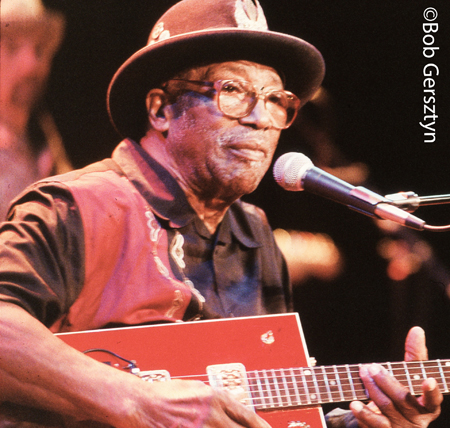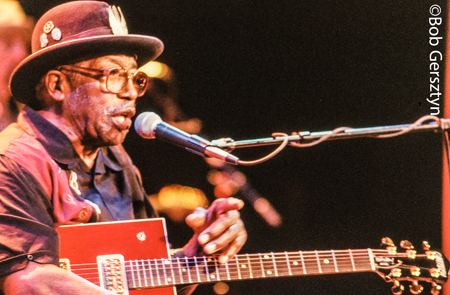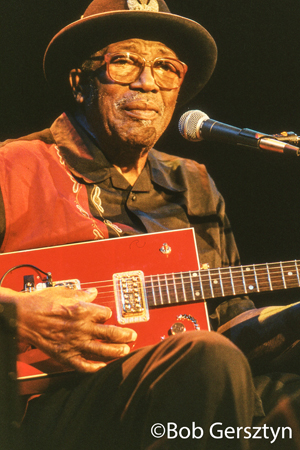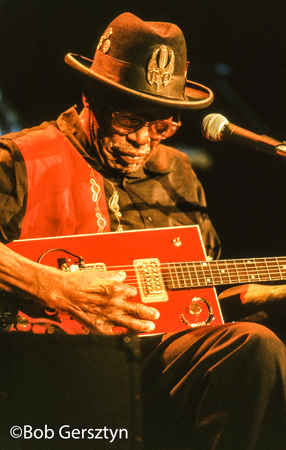BO DIDDLEY

Rock & roll legend, ass-kicker to the end
2006 interview and photos by Bob Gersztyn
(June 2022)
In 2006, Bo Diddley (AKA Ellas Bates McDaniel) performed a show where I live in Salem, Oregon. I attended the show, photographed it and interviewed Bo by telephone a week prior to the show. The story that he told me was fascinating and then, less than two years later he passed away in June 2008. He is a legend and was instrumental in the creation of the then new genre called rock and roll. He was inducted into the Rock & Roll Hall of Fame in 1987. His sound and style influenced everyone after him from Elvis Presley and Buddy Holly to the Rolling Stones as well as musicians in the 21st century.
The concert took place in the beautiful historic Elsinore Theater that first opened in 1926. Upcoming blues artist Ruthie Foster and veteran bluesman Alvin Youngblood Hart opened the show. Bo sat in a chair while he played some of his classics like 1955's "Hey Bo Diddley" and "I'm a Man," along with "Roadrunner" and other classics. He explained that his back was shot and his feet had swollen up from diabetes if he stood very long. By the end of the show, he got up and danced around the stage as he encouraged the audience to shake its booty and was joined by Foster and Hart.
When I interviewed Bo, I was interested in all aspects of his life from his genesis within the church to his observations of life and the music industry over the decades. One thing that was common among many of the early rock & roll pioneers whether black or white was their connection to the church. Musicologists like Robert Darden and John Fahey wrote and talked about how the evolution of Gospel music into Country and Blues and later Rock and Roll only occurred in the Protestant Church. This was due to the loose independent theological flexibility of the Protestant denominations as compared to the more rigid theological structure of the Roman Catholic or Jewish Denominations.
Bo Diddley began his interest in music through the church when he attended with his cousin Gussie McDaniel who adopted him after Ethel Wilson his mother and Eugene Bates his father abandoned him. They moved from Mississippi to Chicago where he was taught how to play classical music on the violin by Professor O. W. Frederick, the minister of music. He played classical music for twelve years and I asked him who first influenced him musically.
"Nobody influenced me to play classical music. I saw a dude with a violin and a stick, and that looked really cool. You know? And my church got together and took up twenty-nine dollars, and that's what it cost, back then. Twenty-nine bucks was a lot of money back then. It was, man (laughter). You could get a sack of potatoes for like damn near ten cents."
During the tumultuous 1960's, Bo wasn't an activist protesting on the streets but rather used his music to help bring about change. Although he wasn't a hippie, the counter culture loved him and his shows broke new ground as mixed audiences attended. He was one of the first bandleaders to feature female guitar players like Peggy Jones, who was called "Lady Bo" and later Norma-Jean Wofford. When I asked him about the civil rights movement and the changes that took place he responded by drawing a comparison to the war on terror in 2006.
"I wasn't involved in that, but I benefited from that, from the people that was doing it. Because this shit should have never been that way in the first place. America has got some deep bullshit going on, you know, that we're walking in. This is a beautiful country, and I think we got one of the greatest systems in the world, but it's got some flaws, a lot of bad flaws, and it makes us no different from the people, like the people that they fighting right now (in Afghanistan and Iraq). We got some shit going on right here in this country that should not be going on. I'm talking about freedom. I don't think that you're supposed to go out and do wrong and then hide behind the flag, but a lot of people are doing that right now. Being a Black man, I used to wouldn't even say shit like that, because I think that one day, everybody would be as one. Regardless of who we are, if the Bible is right, we are all sisters and brothers, regardless of what color we are. What nationality or whatever way you want to put it. That's the way I see it. I never thought about people being black and white, yellow and green and all that crap. We are all one."
Bo then pointed out that when it came to war, it didn't matter what color you were because everyone was involved, regardless of race. However, he explained that when racial discrimination exists, the question asked is, 'why should I risk my life and fight for something that I can't be part of.' He continued, "it ain't no business of mine, I didn't do it, so why should I fight. I'll stay back here and take care of the house. Sweep the floors and all that, but instead, we're all in the same boat, baby. We all in the same boat and America needs to get rid of these standards that we got going on. See, just wake up and smell the roses that's all."
When asked about how racism directly affected his career over the years he was quick to point out the fact that he never received a royalty check from Chess Records. "It went to Sugar Hill [Records] and I ain't seen no money yet," he explained and said that everything that he owns came from "working one nighter's." He said that people don't realize that it was common for artists to not get paid for their songs because there was nothing that could be done. It costs money to hire a lawyer and file law suits so when you're living from gig to gig, you don't have the funds. Then there are statutes of limitation so if enough time goes by, there is nothing that you can do.
"They fight you with your money, and I've been a victim of that, and I'm not happy about it, and I figure one day, maybe before I leave this damn Earth, that I'll go out and look in my mailbox and they'll all be in there. In other words, that ain't gonna happen, this is America. That's what you call a good old American rip off. I been ripped off for millions, baby! Millions! I'm not just saying that as just a word. I've been ripped off. I have never seen a royalty check that came to me. I had some problems with a song. I'm gonna tell you this, but I don't talk about it. A song that I wrote back in 1957 called 'Before You Accuse Me.'"

I had some problems that the publishing company was paying another dude, and my name is Ellas, and they was paying another dude and somebody sees something in a magazine and calls me and says, Bo did you write a song called such and such. "Yep." "Well there's some other dude in there that say he got paid for a song that he don't remember writing." Eric Clapton did the song, but Eric don't have nothing to do with people getting paid. Whoever it was sent the money to the wrong dude. What kind of shit is that?"
Bo was a strong supporter of law enforcement and he became the Deputy Sherriff of Los Lunas, New Mexico for nearly three years during the 1970's. He said that being a Sherriff was worse than being a city cop.
"We got to have law. We got to have it. If we didn't have laws, you couldn't walk the streets. You dig? It's bad now that we got the law. You can't hardly walk the streets. You got crime. People getting away with all sorts of shit. It's just not right. The drug scene can be stopped. If they go through people's shit, like they do if I go to Canada, they go through my guitar case, tearing up shit, pulling stuff loose, wouldn't no drugs get in here. So what is the thing? Everybody turns their head and looks the other way, because we're talking about a dollar bill. There's a lot of money involved in that shit. People ain't gonna hang themselves. They ain't gonna put no rope around their own neck, you know. It's almost like the kids that we're dealing with today. With all the gangs and crap like that. Now when I was a kid coming up, if you were involved in gangs and making trouble in the streets, they put your ass in the Army. You understand? Go in there and learn how to be a man. That's damn near about what needs to happen, I think. Because with this mess that we're fighting right now, we're not gonna win this, because this is a different type of man that we're fighting. I don't know who he is, but this dude is like a ghost."
Bo said that he liked to talk about other things besides "rock and roll" but at the same time, he felt that "rock and roll" can help build bridges into other cultures and he understood that the music had to comply with their cultural and religious requirements. To express his opinion on a diversity of subjects, he said that he was working on a project called "Bo Diddley Speaks" in his studio. He explained that over his lifetime that he had a lot of time to think about the way things are. Even though he was supportive of law enforcement, he saw flaws in it. One of his pet peeves was the use of police dogs.
"We got police running around with dogs, biting people. This is an animal. You can't talk to him, he don't know you and he's trained to kill. That's like giving a nut a gun, and telling him, go ahead, shoot it. If you tell the police dog don't bite me, the dog don't know what the hell you saying. You know? And the man turning him loose to go bite whoever, that is wrong. I think, don't sue the State, sue the person who sick the dog on you. I had a person tell me that a dog jumped on their mother, and I said that I'd like to ask the Governor, or whoever it is, that's been having all this dog jumping on people. I said, "if you have to use a dog for a vicious criminal, then so be it," but for people with a traffic ticket and stuff like that, you going to sick a dog on them? Would you want a dog sicked on your Mother? No, uh uh. You dig what I'm saying? No, this is wrong. This is something that we're fighting against. This is German tactics, Russia and all those kinds of places like that. Now we got it here in America? No, uh uh! That's not right! It's not right, and people need to think."
He said that he wasn't going to bite his tongue about the state of America just because he was an old rock and roller. He believed that the direction that the country is heading in is ultimately going to turn it into something "that we ain't gonna like." At the same time, he had some hope for the future if everyone would have a positive attitude and get "back to doing something worthwhile and nice. America is beautiful and all that good stuff. I don't want people telling me, "I don't like your country, man."
Bo explained that he thought that music has the potential to be able to bring about change. An example that he used was how music can be used to train animals and calm a normally hostile and vicious creature. Conversely, there are parents who have no idea how to train their own kids and then you have "kids going to school with guns. We didn't have no crap like that when I was coming up. That's what you call a change. That's some kind of change, but what kind is it? Is it for the better or the worse? We need to get back to the good book. Our whole thing is based on "God Bless America." You think God's going to bless the bunch of crap that's going on?"
Religion plays an important part in Bo's life and he believes in the veracity of the Bible. He views the good book as a blueprint for our lives, just like you would use a map to find your way around Chicago. When it came to the state of music in 2006 he was very critical of rap music that used dirty and misogynistic lyrics and couldn't understand why the FCC even allowed it to be broadcast. Even though blues used insinuative double entendres in its lyrics, it did not explicitly cross the line. For enjoyment, Bo listened to mostly country music.
"Vince Gill, I like him, and Sheryl Crow, she's my favorite, and Dolly Parton, in the early years. Well now too, I think that girl is remarkable, Charlie Daniels too. There's so many of them, I can't think of their names. There's so many of them, and I love their music, because they got lyrics. Right now rap music wouldn't be so bad, with the part that I'm talking about, if they just clean up what I'm talking about. I like some of the rap stuff, you know? I'm not against it at all, because it's a new generation of music, and a new generation of kids, and every generation's got their own bag of tricks.
When Bo looked back to the chaotic years that rock and roll matured in during the 1960's, he recalled his friend Jimi Hendrix. He knew Hendrix from the years before he hit the big time, when he was the lead guitarist for Little Richard's group the "Upsetters" that did quite a bit of upsetting he recalled.
When looking back on his life, he considered his biggest accomplishment to be the rhythm that he created and he called himself "a rhythm fanatic. I'm not a watcha call a finger fanatic, that you do a lot of little fast picking and stuff, I can't do that but can do that rhythm that'll make you undress."
Bo's guitar playing technique originated from his failure as a drummer. "I wanted to be a drummer, but it didn't work. My hands would not do one thing, while the other was doing the other. They were both trying to do the same thing. I taught my daughter, Tammy Deane, to play drums. She calls herself Tammy Diddley. She's about 4' 7" or something like that, or 5' 2". I don't know, she's short, a little bitty thing, and she plays like a man, and I taught her."
The process that McDaniel would go through to write a song consisted of first writing believable lyrics rather than just spewing out some words to go with the melody. He wanted the song to have meaning and be relatable rather than saying something like "I'll swim the ocean for you, when they can't even get out of the bath tub." He wanted song lyrics grounded in reality that people could relate to and usually wrote the melody first and then fit lyrics to it with something relevant to accompany "whatever way the melody and rhythm is going."
Bo's advice to the kids of then and now was that they needed to go back to the roots of rock and roll which is Gospel, Blues and Country, "don't sample our stuff, think for yourself."
 |
 |
 |